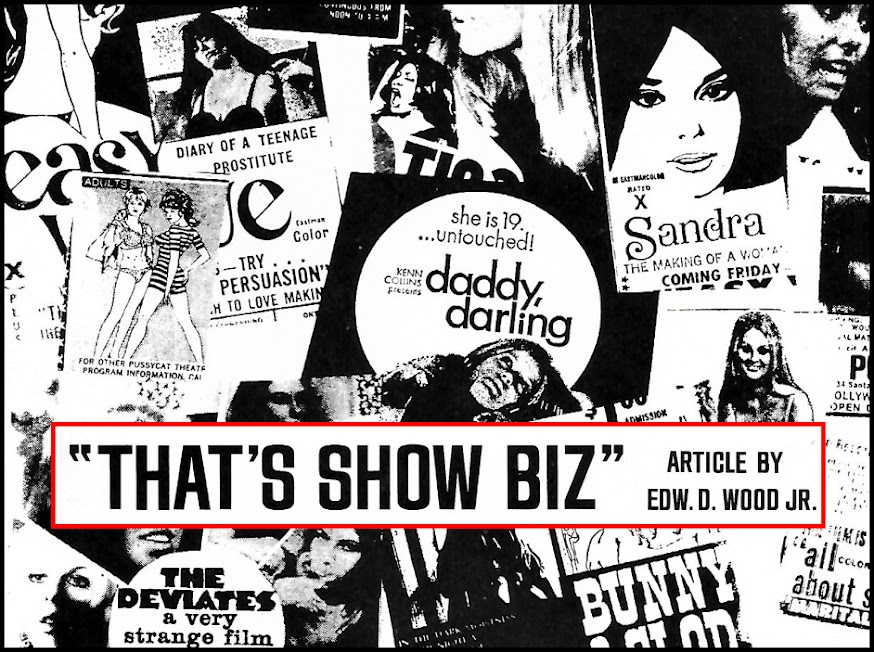 |
| Ed Wood gives us his unique take on film history in "That's Show Biz." |
NOTE: This article continues my coverage of Ed Wood's When the Topic is Sex (BearManor Media, 2021).
 |
| An issue of Blazing Films. |
Excerpt: "Total nudity, both male and female became standard motion picture fare and there was no doubt it was the boost the box office needed. The censors screamed at the top of their lungs and eventually most boards screamed themselves right out of existence . . . and the major boards which did remain started changing their outlook on what they would censor and what they would not censor."
Reflections: This is Ed Wood's capsule history of the American movie industry, mainly concentrating on the challenges that movie studios faced in the decades following World War II—rising production costs, dwindling attendance numbers, fierce competition from television, and outcry from censors over violent and sexually-explicit content. Eddie's basic thesis is that hardcore pornography is temporarily saving the film industry, since it's at least convincing people to leave their homes and travel to the local cineplex. But Eddie warns us that even this trend cannot last forever, since audiences will always demand something new from their entertainment.
"That's Show Biz" is a perfect example of Eddie writing a nonfiction article without doing even a tiny bit of research. He cites no specific dates and uses very few proper names, though he does work in a quick reference to his boyhood hero, cowboy star Buck Jones. Not a single specific movie title or movie studio is invoked here. Eddie only gets specific when it comes to money. He discusses, for instance, the increasing price of movie tickets: "The fifty cent houses climbed to two dollars and fifty cents." And he talks about movie budgets, too: "Three hundred thousand dollar films were starting to cost a million dollars."
This article feels like Ed Wood is pontificating about the movie industry off the top of his head, as if you approached him at a party (when he was already half-bombed) and asked, "Hey, Eddie, where do you think the picture business is headed these days?" And then, he proceeded to answer you in a very rambling fashion for the next 20 minutes or so. Wood's famed stylistic quirks are in full flower here, including his trademark use of ellipses and italics. Here, these elements add to the article's stream-of-conscious feel.
One particularly baffling passage occurs early in the article:
The early builders of the little black box would most certainly have bug-eyes at what has happened to their little invention. From Long Island to the world in seventy years . . . of course it didn't take seventy years for the world to witness the shadow plays up on the silver screen. But throughout the seventy years there has been an ever changing attitude to what is being seen.
I'm not exactly sure what Eddie means by the "little black box" from Long Island. I think he might be referring to wireless radio broadcasts. This article suggests that there were pioneering, historic radio transmissions conducted in Long Island circa 1901, so that would be about 70 years before this article was published. Maybe that's what he's talking about. Otherwise, I'm stumped.
Another interesting aspect of this article is that Ed Wood speculates about the future of home entertainment, well before the home video revolution of the 1980s. As we know, the pornographic loops Eddie made in the 1970s were intended for home use rather than theatrical exhibition, so perhaps that got him thinking about the issue. Obviously, watching an X-rated movie in one's own living room, basement, or rec room provides a degree of privacy that no theater could match. In "That's Show Biz," Ed points out some other advantages to watching movies at home rather than in a theater:
Jack-at-home could rent and view films in the privacy of his home if he didn't like the fare on TV. And he would not fall victim to the parking lot muggers who, about that time, crawled out of the decaying woodwork. Many times the patron found himself paying much more than the high box office demands.
We've all heard the stories of Eddie being mugged on his way to and from the liquor store. So it's natural that he would be wary of thieves wherever he went, even in movie theater parking lots!
Next: "Behind the Film Scene" (1972)

No comments:
Post a Comment